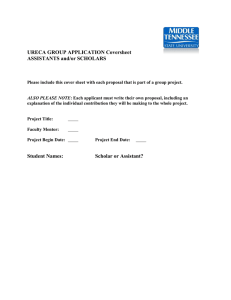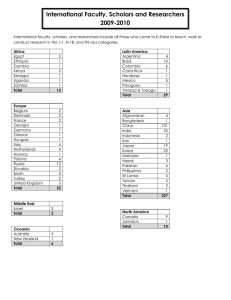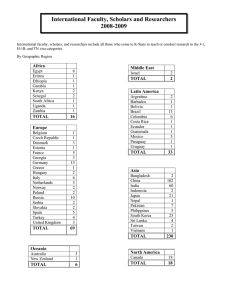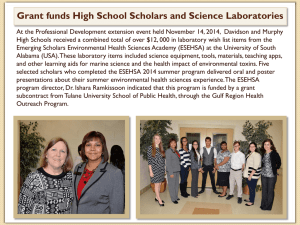ScholarS’ Scope D S P
advertisement
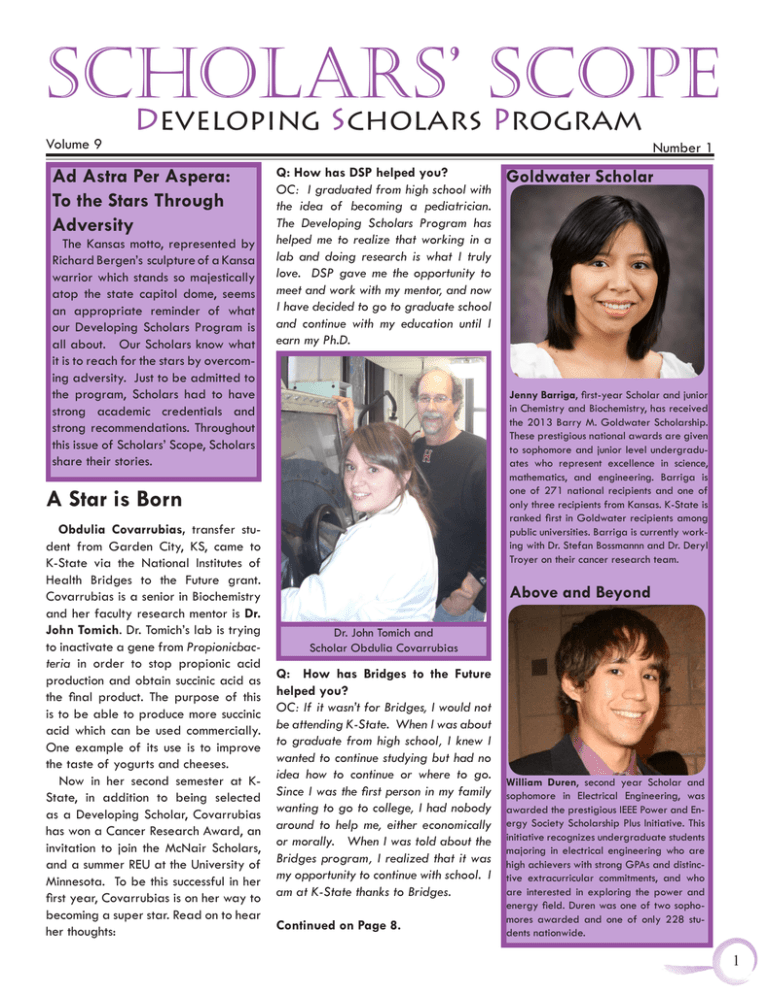
Scholars’ Scope Developing Scholars Program Volume 9 Ad Astra Per Aspera: To the Stars Through Adversity The Kansas motto, represented by Richard Bergen’s sculpture of a Kansa warrior which stands so majestically atop the state capitol dome, seems an appropriate reminder of what our Developing Scholars Program is all about. Our Scholars know what it is to reach for the stars by overcoming adversity. Just to be admitted to the program, Scholars had to have strong academic credentials and strong recommendations. Throughout this issue of Scholars’ Scope, Scholars share their stories. Number 1 Q: How has DSP helped you? OC: I graduated from high school with the idea of becoming a pediatrician. The Developing Scholars Program has helped me to realize that working in a lab and doing research is what I truly love. DSP gave me the opportunity to meet and work with my mentor, and now I have decided to go to graduate school and continue with my education until I earn my Ph.D. Jenny Barriga, first-year Scholar and junior in Chemistry and Biochemistry, has received the 2013 Barry M. Goldwater Scholarship. These prestigious national awards are given to sophomore and junior level undergraduates who represent excellence in science, mathematics, and engineering. Barriga is one of 271 national recipients and one of only three recipients from Kansas. K-State is ranked first in Goldwater recipients among public universities. Barriga is currently working with Dr. Stefan Bossmannn and Dr. Deryl Troyer on their cancer research team. A Star is Born Obdulia Covarrubias, transfer student from Garden City, KS, came to K-State via the National Institutes of Health Bridges to the Future grant. Covarrubias is a senior in Biochemistry and her faculty research mentor is Dr. John Tomich. Dr. Tomich’s lab is trying to inactivate a gene from Propionicbacteria in order to stop propionic acid production and obtain succinic acid as the final product. The purpose of this is to be able to produce more succinic acid which can be used commercially. One example of its use is to improve the taste of yogurts and cheeses. Now in her second semester at KState, in addition to being selected as a Developing Scholar, Covarrubias has won a Cancer Research Award, an invitation to join the McNair Scholars, and a summer REU at the University of Minnesota. To be this successful in her first year, Covarrubias is on her way to becoming a super star. Read on to hear her thoughts: Goldwater Scholar Above and Beyond Dr. John Tomich and Scholar Obdulia Covarrubias Q: How has Bridges to the Future helped you? OC: If it wasn’t for Bridges, I would not be attending K-State. When I was about to graduate from high school, I knew I wanted to continue studying but had no idea how to continue or where to go. Since I was the first person in my family wanting to go to college, I had nobody around to help me, either economically or morally. When I was told about the Bridges program, I realized that it was my opportunity to continue with school. I am at K-State thanks to Bridges. Continued on Page 8. William Duren, second year Scholar and sophomore in Electrical Engineering, was awarded the prestigious IEEE Power and Energy Society Scholarship Plus Initiative. This initiative recognizes undergraduate students majoring in electrical engineering who are high achievers with strong GPAs and distinctive extracurricular commitments, and who are interested in exploring the power and energy field. Duren was one of two sophomores awarded and one of only 228 students nationwide. 1 Ad Astra Per Aspera: Hector Martinez Hector Martinez, sophomore in Architecture, Planning, and Design, is from Garden City, KS. Hector looks forward to being the first in his family to graduate from one of the country’s wellknown universities. His dream career is to become an architect and be able to apply his imagination and drawing skills to real life practicality. Christmas came early to Martinez this past Fall semester when he received a computer, monitor, and keyboard from RTKL Architects in Dallas, Texas thanks to DSP alumni Clemente Jacquez-Herrera. Since architecture students are required to have specific programs for their studies, this gift was especially timely for Martinez, who had been using a borrowed computer. Jacquez-Herrera says, “This gift doesn’t solve huge financial burdens, but it is a help nevertheless. I do hope that the student will understand that this is not a gift, but rather an award earned through self-merit. To deserve it, he/she must continue to pursue academic excellence. That is using it appropriately.” Martinez is currently working with Michael Gibson, assistant professor of Architecture. They are studying radiation and its effects on the siding of buildings, especially with respect to temperature changes. Martinez also understands the concept of giving back. He continues to contribute to his community by coaching a soccer team in his hometown and he will also be a Residence Hall Assistant in the fall. 2 The Right Medicine Pfizer Pharmaceuticals has been a strong supporter of Developing Scholars in the areas of Animal Science and Industry and Pre-Veterinary Studies. Their contributions have benefited a number of our undergraduate researchers, and now we are seeing their investment blossom. Four of our DSP undergraduates have graduated and are now working on their master’s degrees in Biomedical Sciences: * Jose Valles, Liberal, KS, Master’s in Biomedical Sciences, May 2013 *Johanna Diaz, Garden City, KS, second year, Veterinary Medicine. Pictured with husband Scholar Roberto Diaz and daughter Lena. * Priscilla De Los Santos, Olathe, KS, first year, Master’s in Biomedical Sciences * Kristina Bigelow, Manhattan, KS, first year, Master’s in Biomedical Sciences Studying Effects of Celestial Travel Dr. Thomas Barstow and Scholars Jonathan Bernard, Eduardo Acosta, Luis Chavez, and Yojana Mendoza have been anticipating the completion of a cutting-edge addition to the K-State Kinesiology department. K-State will host one of two microgravity simulators – or hoists - in the nation. Currently, the only other facility with a hoist system is NASA’s Johnson Space Center, but it is currently inoperative. “[K-State] will be the only place with a support system that can simulate lunar or martian gravity,” remarked Dr. Barstow. The hoist will be used to simulate the physical exertion that astronauts would experience in non-Earth atmospheres. By looking at the higher rate of human physiological deterioration in space, the weight of the space suit, and the exertion of doing physical activities in different gravitational fields, the variables for calculating the minimum level of conditioning needed for Mars astronauts can begin to be assessed. This is where the hoist is particularly beneficial. In Earth’s atmosphere, the two hundred and fifty pound space suits would make mobility impossible. The hoist will factor in the suit weight and the smaller gravitational pull of the Moon or Mars. The combination of these factors will be simulated by a cable system attached to large beams. Barstow discussed how this will give subjects the same sensation as being on the Moon or Mars. Barstow and his team of graduate and undergraduate students will then use an ergometer – like a treadmill or ladder - to replicate how oxygen cost changes in different gravitational environments. Bernard said about the project, “It’s exciting because, since I’m focused on medicine…it’s nice to be surrounded by people in a Kinesiology lab who are very cognizant of the human body. A dream of mine has always been to be a physician for astronauts, studying the effects that space has on the human body.” Dr. Thomas Barstow and Scholar Jonathan Bernard Edgerley-Franklin Urban Leaders Serve During Alternative Spring Break According to the scholarship website, the Edgerley-Franklin Urban Leadership Scholarship, generously sponsored by the Edgerley and Franklin families, strives to shape the next generation of great American urban leaders. Through scholarly work and service, Edgerley-Franklin Leaders will be inspired to become exemplary citizens who will shape all aspects of American urban society while inspiring others along the way. This March, members of the cohort split up to participate in the university-wide Alternative Spring Break program. Jonathan Bernard, sophomore in Biology/Pre-Med, Zachary Jones, sophomore in Biological Systems Engineering, and Rebecca Renteria, freshman in Secondary Education and History traveled to Memphis, TN to work at St. Jude Children’s Research Hospital. Miguel Valdes, junior in Mechanical Engineering, Michelle Foster, senior in Political Science and American Ethnic Studies, and Ismael Hernandez, sophomore in Construction Science and Management traveled to Chicago, IL to work with the Boys and Girls Club, Inc. Lastly, Sonjay Baker, freshman in Mechanical Engineering visited Denver, CO to work with Teach for America. Congratulations to the 2013-2014 Edgerley-Franklin Urban Leaders: Navante’ Peacock: Haysville, KS Sergio Ortiz: Kansas City, MO Cipriana Sapien: Wichita, KS Yubisela Toledo: Liberal, KS Geordy Williams: Overland Park, KS Scholars Miguel Valdes, Michelle Foster, and Ismael Hernandez enjoying Chicago, IL. Way to Go 4.0! The following students received a 4.0 for 2012: * Jenny Barriga (F) * Nallely Barron (S, F) * Jonathan Bernard (F) * Phuoc Van Bui (S) * Matt Castinado (S, F) * Johanna Diaz (S) * William Duren (S, F) * Marcus Dominguez (F) * Michelle Foster (S) * Adrian Gomez (S, F) * Ismael Hernandez (S) * Pamela Maynez (S) * Jessica Nguyen (S) * Mayra Perez-Fajardo (S, F) * Breyana Ramsey (F) * Stephanie Skinner (S, F) * Caleb Wurth (S) Scholar Sonjay Baker and his team in Denver, CO. Scholars Jonathan Bernard, Zachary Jones, and Rebecca Renteria with their Memphis, TN team at St. Jude Children’s Research Hospital. 3 Ad Astra Per Aspera: German Cuevas German Cuevas is a self-proclaimed “alchemist of dreams.” A freshman who attended school in St. Joseph, Missouri, he was encouraged to dream big dreams. Cuevas has a passion for serving others. He hopes to fulfill this passion by earning a Biology degree and then attending medical school. His parents, Cuevas explains, always told him that dreams are not merely dreams; they can also be honorable goals. To this end, he is conducting research under the careful tutelage of Dr. A. Lorena Passarelli, Biology, in order to turn his dream into a reality. “In matters of modern science,“ Cuevas says, “the inexplicable is inexhaustible…and I have always thought that the way one knows something is through doing it.” Cuevas is putting this idea to the test by working in Dr. Passarelli’s research lab. “I have always sought knowledge, not information,” he says. With Dr. Passarelli’s guidance, Cuevas is working to characterize the specific function of a gene, Ac79, in a baculovirus, or insect virus. These baculoviruses are viruses that commonly infect insects such as crop pests. This knowledge could later be applied to the design of biological pest control agents. Cuevas, whose family originally came from Guadalajara, Mexico, also loves poetry which he memorizes in order to better understand its meaning. “I want to be a Renaissance man,” he explains, “and I believe that medicine and poetry go well together. One heals the body and the other heals the soul.” Freshman Superstar in the Making Freshman Scholar Daniel Dissmore began working with Dr. Wayne Goins, professor of Music and Director of Jazz Studies, this year. Dr. Goins, long-time professor of jazz at Kansas State “was born playing blues.” Shifting to jazz in high school, he has since had experience in Boston, Chicago, and Atlanta. Goins spoke with excitement and passion in his voice about Dissmore, “I haven’t had many trumpet players come along that have an ear like his…he could be a star.” Over the past year, Goins and Dissmore have worked together to craft a truly unique piece of research. They began by looking at a history of jazz trumpet, then narrowed the project to focus on a very specific album – the influential Kind of Blue by Miles Davis. “Miles was a rebel…when everyone was playing fast and hard, he was playing slow and smooth,” remarked Goins. Their research has a historical component, an archeological component, and a performance component. Dissmore began the project with the historical - researching how Davis’ album fits into the larger scope of jazz history. He then studied Davis’ solo, So What, deconstructing it in order to understand how it was built and how to execute the music from a physical standpoint. “It took a lot of listening. I had to break it down measure by measure…on that high b-flat, I would intentionally make it squeak,” said Dissmore. Goins agreed, “He had to digest the phrasing, the tone, and the dynamic shape. It’s all about the subtle nuance – you have to do all these little bitty things.” As these details were uncovered, the performance component emerged as Dissmore physically imitated the way that Davis played. Goins said it was about more than just music though. The two of them have forged a strong working relationship. “People with a lot of talent are always needing a new challenge. I’ve pushed [Dissmore] a lot. Every time I’ve challenged him, he’s stepped up.” DSP has given them a reason to come together early in Dissmore’s career. “We are just getting started…his potential is just off the charts,” Goins said proudly. Next Steps at K-State Xavier Gavin, third year Scholar in Interior Architecture and Product Design, has just received admission to the Master’s program in the College of Architecture, Planning, and Design here at Kansas State. Luis Chavez, third year Scholar in Biology, has just been accepted to the Master’s program in Kinesiology, also here at Kansas State. Gavin and Chavez will both begin their graduate studies in the fall. 4 Shining Bright in the Social Sciences Many people associate research with hard science or STEM disciplines, but research is certainly not limited to these areas. DSP Scholars are contributing to important innovations and discoveries in a variety of disciplines across the K-State campus. Denise Durham, freshman Scholar and Dr. Roger McHaney, professor of Management Information Systems have been evaluating whether the current increase in internet usage is correlated with a decrease in students’ writing ability. By accessing and evaluating eight years of longitudinal message board posts, McHaney and Durham observed no significant changes – perhaps indicating the internet is not necessarily ‘making us dumber’ as some have claimed. “We have great ideas for the future as well, and we will find a way to keep this research streaming ahead,” McHaney said. Marcus Dominguez, freshman Scholar and Dr. Alisa Garni, assistant professor of Sociology, are researching national changes in immigration policy and where Kansas legislation falls comparatively. They will consider issues such as discrimination as well as the affect of policy on public benefits, the educational system, and the enforcement of these policies. “Many in the DSP program deal with natural or physical sciences, but doing research on the social sciences is very unique because it deals with people, not numbers or cells,” said Dominguez. “This [research] is important since society forms who we are and the lives we live, and right now our society has a lot of different perspectives on immigration and it is crucial to find out how this affects everyone.” Phillip Hill, sophomore Scholar in Marketing is currently working with Dr. Esther Swilley, assistant professor of Marketing and Ashlee Hampton, senior in Marketing. Their team is studying consumer attitudes towards advertisements and whether consumers purchase intentions are influenced by blogs, pins, and reviews on social media sites. The goal of their study is to aid marketers by understanding the influence consumer reviews and social media can have on corporate advertising campaigns. Branford Harris, sophomore Scholar and Dr. Sam Mwangi, associate professor of Journalism and Mass Communications are studying crowdsourcing. Crowdsourcing is a recent approach that outsources a company’s research and development to a large and general population, often through the use of social media. Harris and Mwangi are researching case studies of crowdsourcing such as Frito-Lay’s recent Facebook poll for selecting a new chip flavor. Harris hopes to develop a model that will help companies in the effective use of crowdsourcing. Mwangi discussed the popularity of the approach in contrast with the lack of knowledge about how to use it effectively and said of Harris, “He is really on the cutting edge of things.” The model could have a variety of uses and be adaptable to both for-profit and non-profit organizations, to help them know how best to obtain and process the large amounts of input that they are receiving from people across the globe. One Familia de DSP Family is an integral part of K-State. DSP has always considered itself to be a family of Scholars working collaboratively to improve not only their own lives, but to have a positive impact on society as well. We see this concept carried out daily as faculty members volunteer to mentor inexperienced undergraduates and teach them how to become scientists and enquirers of one stripe or another. It is taking the concept of “family” full circle when a Scholar’s actual family reaches out to contribute to the larger family of Scholars. The Gomez family of Shawnee, KS is such a family. Both of the Gomez sons, Bobby and Phillip, have participated in the Developing Scholars Program. Bobby and Phillip’s parents, William Gomez and Dr. Julie Alvarez-Gomez, have also become a valued part of our program over the past eight years. Developing Scholars has been fortunate to consider William and Julie a significant part of our “familia.” The DSP values the contributions of our families. The Developing Scholars Program welcomes two Kansas State University Honors Program presenters to our symposium: Brianne Pierce and Kevin Garman. 5 Engineering for a Greater Good As the first land-grant college created under the Morrill Act, Kansas State University has a long history of engineering scholarship. Within the Developing Scholars Program, we have students majoring in many different engineering disciplines. Occasionally, students in complimentary disciplines are brought together as members of a research group under the tutelage of a faculty mentor. Hannah Gray, freshman in Biological Systems Engineering, and Austin White, sophomore in Electrical Engineering, are an example of this. With their faculty mentor Dr. Steven Warren, assistant professor of Electrical and Computer Engineering, Gray and White are working on the development of a bed-based monitoring system. The system will be used at Heartspring, a Wichita, KS center that provides educational, therapeutic, and residential services to children and youth with special needs. A representative from Heartspring sought out the expertise of Dr. Warren and K-State after attending a conference on biomedical instrumentation using wearable and wireless sensors for monitoring. “For this partnership, I received a grant from the National Science Foundation to fund the materials for the project for five years,” Warren said. Scholars Hannah Gray and Austin White with Dr. Steven Warren The bed monitoring system will capture three different types of data: heart rate, respiration, and humidity. Warren said, “The data obtained will be used to help quantify a person’s physiological activity and assist the overnight staff at Heartspring.” The residents of Heartspring range from age 5 to 21 and have a variety of disabilities, including autism. Many of these children 6 Dr. Steven Warren’s Team: (L to R) Greg Nitcher, Kaleb Anderson, Neelou Hadavandifard, Scholar Hannah Gray, Dr. Punit Prakash, Scholar Austin White, Dr. Steven Warren, and Wen Song and youths have needs that exceed local and family support. As many as 60% of the residential students are non-verbal, making unobtrusive monitoring systems a fantastic way to communicate their needs. White has been working on the sensor for respiration monitoring. He has been looking at existing technologies that are most compatible with the Heartspring residents. The main criterion is that it be durable while discreet. Many students at Heartspring have developmental delays and other diagnoses, some of which intensify sensory input, which makes noticeable monitors very problematic. This semester Gray has been working on the humidity sensor selection for the system. This sensor will detect bedwetting, which could be used to help train the student to know when they need to use the restroom. This will allow the staff at Heartspring to monitor the status of a student’s bed without physically going to check if it is dry, which currently occurs every 30 to 60 minutes. This is particularly helpful with students who are bothered by staff intervention while sleeping. Gray is looking forward to an upcoming tour of the Heartspring campus. She says she is anxious ”to see what technology is already in place and to learn more about the actual residents.” Gray and White greatly appreciate the experience of working on this project because of the marketable skills they are gaining for their future endeavors and the value of the real-life application of their bed monitoring system. Dr. Stefan Bossmann Cancer Research Awards The Johnson Center for Basic Cancer Research awards undergraduates for their contributions to cancer research. Recipients receive $1000 for themselves as well as $1000 for their lab. This past fall semester, twelve Scholars were awarded Cancer Research Awards: * Joshua Ames & Dr. Dorith Rotenberg * Morgan Armbruster & Dr. Ruth Welti * Jenny Barriga & Dr. Stefan Bossmann * Nallely Barron & Dr. Annelise Nguyen * Phuoc Van Bui & Dr. Mark Weiss * Obdulia Covarrubias & Dr. John Tomich * German Cuevas & Dr. A. Lorena Passarelli * Adrian Gomez & Dr. Deryl Troyer * Pamela Maynez & Dr. Stefan Bossmann * Elizabeth Riedy & Dr. Stefan Bossmann * Alexander Vo & Dr. Masaaki Tamura * Jazmin Zeledon & Dr. Sherry Fleming Rising Stars Phuoc Van Bui and Adrian Gomez Congratulations to Phuoc Van Bui, Microbiology major from Garden City, upon receiving the University Award for Distinguished Undergraduate Student in Research and his acceptance to Kent State University College of Podiatric Medicine. Phuoc has been a research assistant in the lab of Dr. Mark Weiss for the past three years. Phuoc is also the recipient of the inaugural Eclipse Award for a Developing Scholar whose potential is seen as having the capability to eclipse the work of the mentor; that is, the scholar works in the shadow of the mentor only to emerge a rising star on the other side. Dr. Weiss has great expectations for him: “Van is a valued member of my team…. I consider Van a “prize” that all professors like to win: An excellent student who has the chops to one day be a medical and scientific leader…. All in all, he is an excellent model of the professional human….His level of research skills and productivity place him in a class by himself. Beyond his research, Van Bui is a complete human who models generosity, dedication, and leadership and reflects the Wildcat spirit.” While some of us know him as Phuoc and some of us know him as Van, we all plan to know him as Doctor Bui. Reflections of a Third-Year Scholar: Adrian Gomez For the past two years I have worked in the stem cell and cancer biology laboratory of Dr. Deryl Troyer at Kansas State University. He has been my mentor and a great role model. This particular research is appealing to me because I believe working on a cure for cancer is worthy and rewarding, with real-life applications. I have had the opportunity to work on a variety of projects ranging from magnetic hyperthermia (killing cancer cells by using heat) to neutrophil differentiation (a process in which a less specialized cell is transformed into a more specialized cell). My current work includes investigating umbilical cord matrix stem cells for the delivery of therapeutic molecules in magnetic nanoparticles. “Research has afforded me a leverage that will be crucial.” Many of the techniques that I have learned as part of my research have reinforced what I have learned throughout my undergraduate career. Learning about fluorescent proteins as markers for gene expression, PCR, or flow cytometry from a textbook can seem so complex and difficult to understand. However, when you actually perform such techniques in the laboratory, whole new understandings of cellular processes appear; I have been able to see how cells work and function. Research has given me a deeper understanding and has allowed me to appreciate my science on a whole new level. Gaussia Luciferase is the specific organism (capepod) that produces this gene that allows the organism to light up. This gene has been isolated to help researchers locate cells. (This is what fireflies use when you see them at night or jelly fish that glow.) We have used this gene in our delivery cells to allow us to “track” our cells when we send them to tumor sites. The application of cellular biology, such as using a protein that emits light to study genes, has made biology more meaningful and much more useful than just answering questions on an exam. This early experience of turning passive learning into active learning will allow me to excel in dental school due to the abundant amount of hands-on activities required. Research has afforded me a leverage that will be crucial. I have met individuals with similar interests, gained confidence, and have deepened my connections throughout the community. By presenting my research at symposiums and speaking with other undergraduate researchers, graduate students, post-docs, and my mentors, my eyes have opened to the spectrum of research in academia. The interactions with so many brilliant minds in one area who are so passionate about their work have made my research presentations a fulfilling experience. Whether I’m giving Dr. Troyer a hard time about college football (He’s a Nebraska alum) or discussing tumor homing peptides, he always updates me with new information and instructions to keep me going on my project. Most importantly, this experience has taught me a lot about myself. Because the Developing Scholars Program carries the responsibility of a prestigious position, this privilege has taught me responsibility, commitment, accountability, and leadership, all of which have helped me discover myself as a person and have challenged me to become a life-long student. The learning curve has been steep, but my journey has been enjoyable, thanks to everyone involved. I have come out a smarter and more prepared student to face the world. Adrian has been accepted to the School of Dentistry at the University of Missouri- Kansas City 7 Spring Graduates: * Eduardo Alvarado: B.A., Economics & Philosophy * Morgan Armbruster: B.S., Life Science * Phuoc Van Bui: B.S., Microbiology/ Pre-Med * Luis Chavez: B.S., Biology * Michelle Foster: B.A, American Ethnic Studies & Political Science * Adrian Gomez: B.S., Biology & Gerontology * Stephanie Jacquez: B.S., Food Science & Industry * Katelyn Kowal: B.S., Management Information Systems * Victor Moreno: B.S., Psychology * Elizabeth Riedy: B.S., Biochemistry * Caleb Wurth: B.S., Feed Science & Management Alumni Advance: * Ariel Anib: Accepted to M.S. program in Global Policy Studies at University of Texas * Greg Corbin: J.D., Boston University School of Law * Jesus Garcia: M.S., Anatomy and Physiology from Saint Louis University; Medical School, University of Kansas * Olga Martinez: D.D.S., University of Missouri, Kansas City * Sean Tomlinson: Ph.D., Chemical Engineering, Kansas State University * David Villanueva: Medical School, Universidad Autónoma de Guadalajara, MX * Clemente Jacquez-Herrera: Received one of three International RTKL Kagan Awards THANK YOU for Your CONTRIBUTION in 2012: Dr. Daniel and Mrs. Kathryn Richardson Mr. Andrew Kowal Mr. Jorge Mendoza Mr. Ryan McGrath and Dr. Natalie Mladenov Mr. Gary and Mrs. Susan Yenzer Mr. Michael S. Barker and Mrs. Rachel Barker Mr. Victor L. Hernandez and Mrs. Delia M. Hernandez Mr. Robert Marin, Sr. and Mrs. Delia Marin Mr. Lance Vogel and Mrs. Jennifer Vogel Mr. Russell A. Weaver and Mrs. Regina K. Weaver And In Kind Contribution: RTKL Associates Mr. Clemente Jacquez-Herrera Mr. William Gomez and Dr. Julie Alvarez-Gomez Become a Developing Scholars Donor Your tax-deductable donations are greatly appreciated. Checks can be made payable to: Developing Scholars Program, K-State. Mail to: Developing Scholars Program Kansas State University 201 Holton Hall Manhattan, KS 66506-1309 To learn more about Developing Scholars visit: http://www.k-state.edu/scholars/ 8 Caleb Wurth: Going Places A 2013 graduate in Feed Science and Management, Caleb has accepted the position of Trading Analyst for the investment bank of JP Morgan Chase & Co. in New York City. He will join their Global Commodities Group Sales & Trading team in June 2013. Covarrubias from Page 1 Q: What would you tell future Bridges/DSP students? OC: What I would tell future Bridges/ DSP students is that everything in life is possible. Things are easier to achieve when you have a dream. Look for someone that will make you stronger to continue fighting for your dreams and not let you give up. My favorite quote from Paulo Coelho says: “There is only one thing that makes a dream impossible to achieve: the fear of failure.” Bridges to the Future, sponsored by the National Institutes of Health is focused on under-represented students who wish to pursue careers in the sciences. Participants begin their work at a community college and transfer to complete their degree at K-State. In 9 years of Bridges, 82 students have participated in the Developing Scholars Program. The Bitterroot Was Sweet Alexandra Dominguez, senior in Fisheries, Wildlife, and Conservation Biology, attended the Office of Research and Educational Opportunities for Students at the University of Montana for a summer internship. The internship focused on fish ecology, so Alexandra got to spend much time outdoors along the beautiful Bitterroot River. At the end of the summer, the research project Alexandra presented was “Slimy sculpin Cottus cognatus associations with habitat parameters in tributaries of the Bitterroot River, MT.” What did Alexandra think of her summer experience? Sweet!
